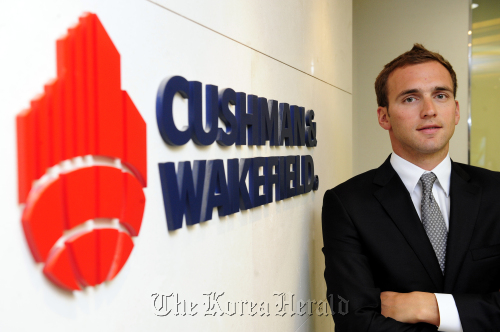With real estate being an essential element in any business that requires stores or offices, the industry ties in to most conventional businesses.
Real estate services provider Cushman and Wakefield Korea is taking that natural tie-in a step further.
Since last year, the company has been supporting retailers to cross borders.
“It’s split into two major sections. We’re helping to export Korean retailers to foreign markets in Asia, Europe and the US. And on the other side we’re helping bring new International retailers into Korea,” Associate Director for retail transaction services James Assersohn said.
Overseas expansion projects Cushman and Wakefield have worked on include the opening of CGV cinema in California and CJ Foodville’s Bibigo restaurants and the Tour les Jour bakeries in China.
For foreign firms, Assersohn says, “while the Korean market is becoming increasingly attractive it also continues to present difficulties such as the ‘jeonse’ system which involves leasing property based on large upfront deposits that western firms find difficult to understand, and our company’s services can help educate the retailers on these issues and aid them in addressing such issues.
“We have knowledge of the majority of shopping malls, landlords, and we know the high streets very well,” Assersohn said. He added that his company also helps foreign firms find local partner as well.
“If you are coming from Europe to Asia, you’ve got to understand differences in culture, and differences in trading,” Assersohn said.
“Also same goes for going from Asia to Europe, Asia to the states, there are differences in how you are going to trade. Even in Asia there are differences from country to country. We help them understand that difference.”
In selecting overseas retailers for the Korean market, Assersohn says that the company is targeting those in the segment missing from Korea.
“I think Korea has a distinct gap. We’ve got the people like H&M and Zara, and then we have the luxury brands. There is very little in between, in terms of retailers that are offering luxury clothing but aren’t at the Louis Vuitton prices,” Assersohn said.
 |
James Assersohn. (Park Hae-mook/The Korea Herald) |
Assersohn is currently working with three big SPA brands and eight brands that are priced between luxury and mid-priced brands that are currently looking to launch in Korea.
Shawna Yang, an associate director who works with Assersohn in retail cross-border business, explained the gap filled by the company’s services.
“I think Korea’s fashion market is very large, but the way we have had these brands come in last among the Asian nations is because we do not have as many shopping centers as there are in other Asian gateway cities,” Yang said. She added that in other Asian markets such as Hong Kong, large developers own several shopping malls, enabling a brand to open a number of stores simultaneously by dealing with a few developers.
Cushman and Wakefield Korea executives also said that the country may now be ready for western-style shopping malls to take off.
Yang said the rent for stores in Myeongdong has grown at an annual rate of 15 to 20 percent in the past eight years, while the figures for offices have increased at 3 to 4 percent.
“The Korean market has been dominated by department stores, but I think a lot of young people have experienced shopping mall overseas, and they are waiting for the shopping mall experience,” Yang said.
“There is a lot of money waiting. I think institutional investors have been putting a lot money into offices, and I think the next item is retail or hotel, but with retail, in order to attract investment, the developer needs to create a product based on the understanding of the micro market, right tenant mix and good retail architecture. ”
By Choi He-suk (
cheesuk@heraldcorp.com)








